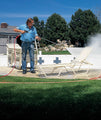Cleaning Your Vehicle’s Engine
Published:
6/23/2020
There are a lot of people who spend tons of time and energy cleaning the bodies of their vehicles, but they don’t devote as much of that attention to cleaning the parts that are hidden from plain sight, mainly, the engine bay. As a result, dirt, grime, oil, and more can coat the most important part of your vehicle, which could hinder your car’s performance.
Pressure washing the engine bay of your vehicle on an as-needed basis is an important part of car maintenance.
Here are a few tips for cleaning your vehicle’s engine:

best time to wash
Most mechanics believe that engine washing is necessary to proper car maintenance, however, this is mostly for cosmetic reasons. If you have an oil or coolant leak, you should most definitely clean your engine. If you are preparing your car for sale, you should also clean your engine. If you notice a build-up with dirt, exhaust residue, and grime, get it clean. You should never clean your engine when it is hot; doing so could potentially result in cracks in the metal, which will do severe damage.
Protect Electrical Work
There are many electrical components located underneath your hood. Before you use a pressure washer to clean the engine, it is essential that you cover these components with saran wrap. It will prevent water from getting into the parts and causing damage.
Soften up Grime
Regular cleaning detergent usually won’t do the trick when you are pressure washing a car engine. Instead, you will need a degreaser detergent that can soften up grease and other grime so that you can remove it.
We recommend a caustic-based detergent such as Hotsy Brown or Ripper II, which are solutions designated for vehicle engine cleaning and are tough acting on carbon-based residues like road film and exhaust stains, to get this task done.
Pour this detergent on to your engine when it’s cool and then let it soak in before using a firm brush to work it all the way into your engine. This should loosen up all of the dirt on the engine.
Use Low Pressure
In terms of pressure, you will want to lower the pressure of the machine you are using to clean your vehicle. The most common PSI values for automotive cleaning range from 1,200 to 1,900 PSI, but we recommend lowering the value while cleaning the engine, so you do not damage the electrical parts. Avoid using extreme water temperatures (either too hot or too cold) when washing your engine, as this can also do damage.
Once you’ve established a proper PSI and moderate water temperature, blast away all of the detergent, which should take the grime along with it. You don’t have to hold the pressure washer’s wand too close to the engine to do this. Holding it too close will result in water pouring into parts where it shouldn’t, such as the alternator, engine sensors, and belts, where corrosion can happen.
Ensure The Engine is Dry
Once you’re done spraying all the detergent away, your engine should be clean. Use either a microfiber cloth or old rags to dry it off. This will give you the chance to wipe away any grime you might have missed with the pressure washer. Compressed air is recommended by most mechanics in this final step; completely drying your engine is absolutely crucial.
We want to stress how important it is to consult your car’s instruction manual prior to doing any type of engine cleaning. There may be a specific set of instructions that your maker recommends. Always follow these instructions first and foremost.
Want to purchase a pressure washer to use for cleaning car engines and so much more? NorTex Sales & Service has hot and cold-water pressure washers for sale that can wipe the toughest surfaces clean, as well several different lines of detergent products. Call us at 214-630-7310 to order one.
Related Reading: Signs Your Pressure Washer Needs a Repair
Share this Article ↓




